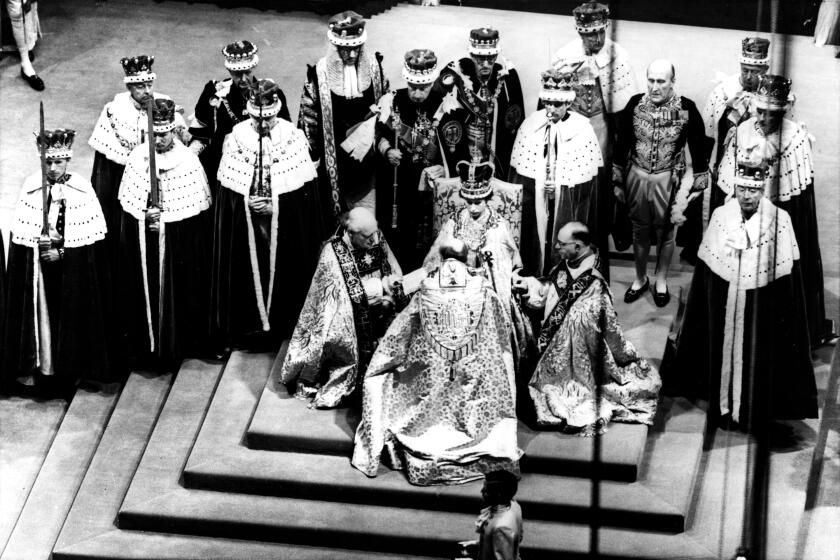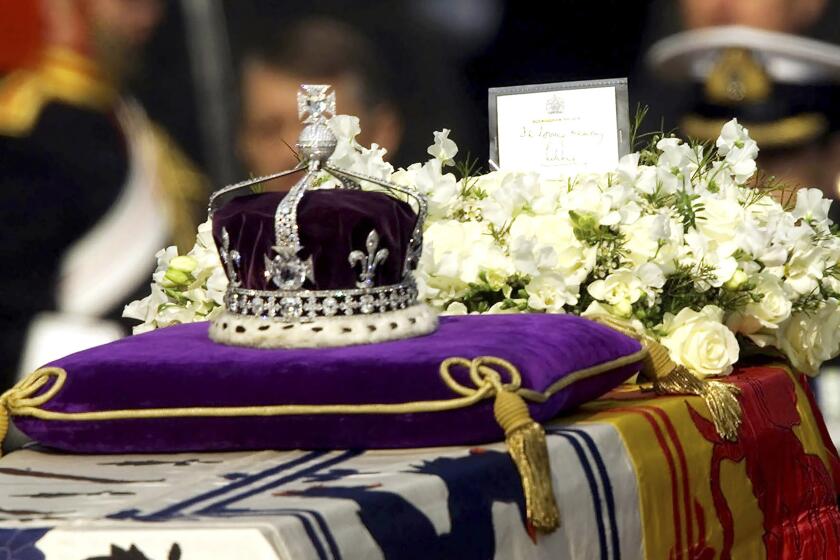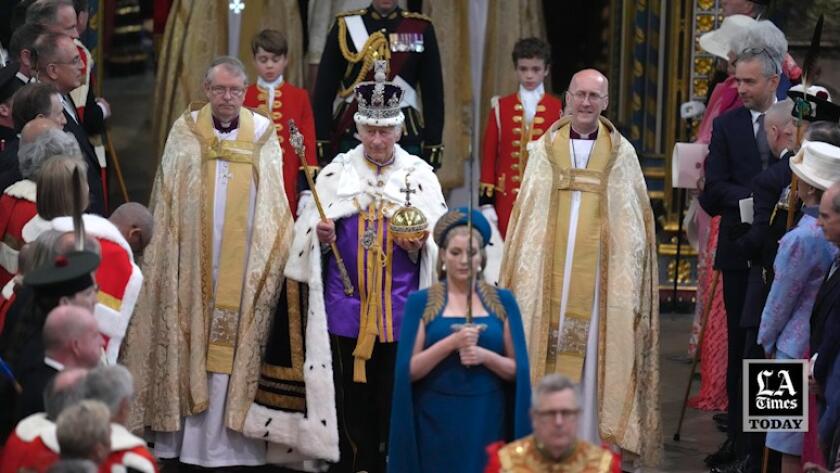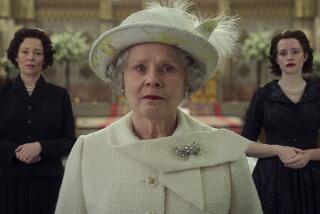King Charles inherits a changed Britain — and public apathy about the crown
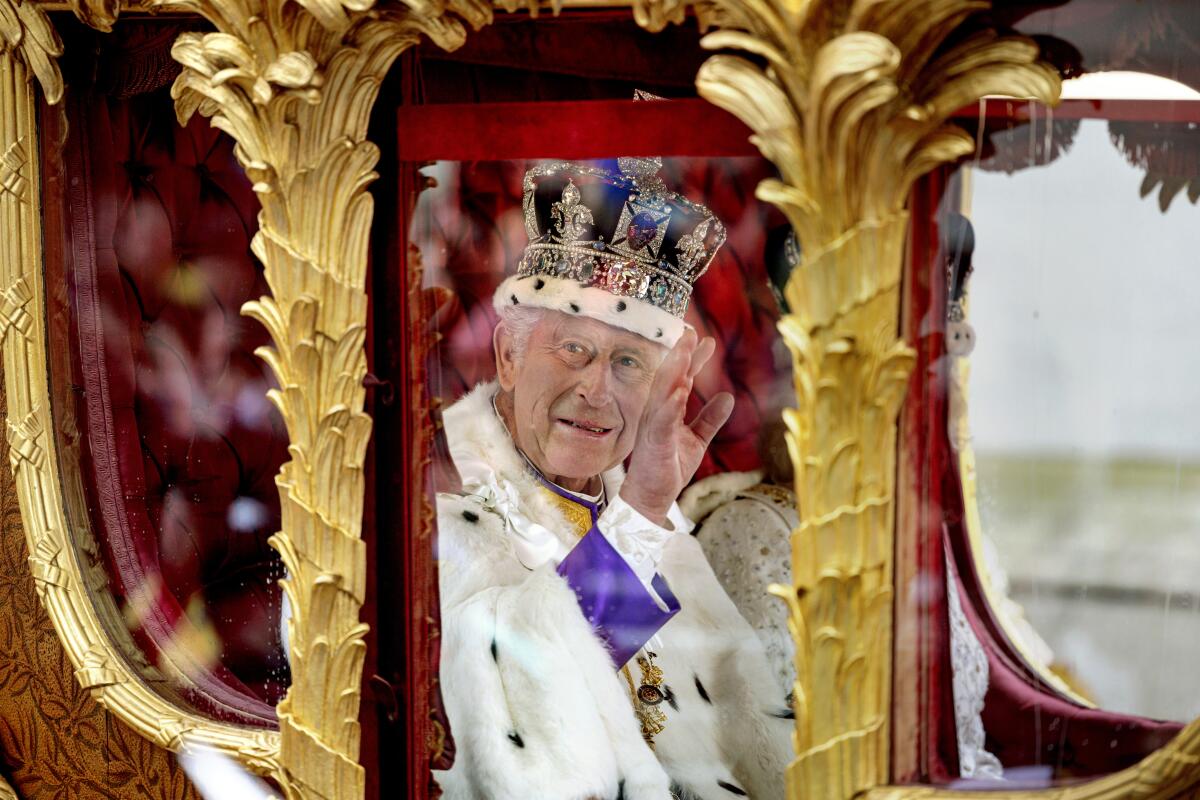
Your Majesty, and almost the thousand years’ worth of majesties before you — Britain can’t seem to quit you.
At least not so far.
Seventy years ago, the coronation of Queen Elizabeth II inaugurated what Winston Churchill dreamily hoped would be a new Elizabethan age. His turn of phrase suited a homogeneous and class-abiding Britain yearning for an end to postwar privations, a country that didn’t really recognize the emerging restiveness of the Commonwealth nations beyond its borders.
On a damp Saturday this month, with the words of an ancient oath and an already relentlessly tested modern pledge “not to be served but to serve,” King Charles III had the same St. Edward’s Crown placed on his head, and a very different set of challenges put on his shoulders.
The monarchs, mother and son, are as different as their times. Elizabeth II was perforce a kind of cipher, less a personality than a series of roles, a virtually voiceless princess, a daughter, wife, mother, and at last queen.
King Charles III, with decades of a public quest to craft a role as heir, is beyond familiar. The British press has amply chronicled his environmental dedication, first mocked as fringy, now a matter of survival for the planet; his successful Prince’s Trust charity for at-risk young people, whose most famous alum is actor Idris Elba; his appetite for knowing other faiths and cultures; and of course Charles’ mortifyingly public romantic and marital turbulences.
Get the latest from Patt Morrison
Los Angeles is a complex place. Luckily, there's someone who can provide context, history and culture.
You may occasionally receive promotional content from the Los Angeles Times.
Meanwhile, bits of his mother’s Commonwealth have broken off like ice from a glacier, and more may soon do so. And almost half of Londoners today — among them Rishi Sunak, the new prime minister who is a Hindu who read a Bible passage at the coronation — are people of color.
They’ve introduced new cultures and ideas to the country. The already years-old joke is that the United Kingdom’s national dish is not anything so retro as fish and chips, but the fusion-Indian meal chicken tikka masala.
Brexit has sent seismic cracks through the economy and politics. Self-inflicted royal family wounds have cut a nasty slash across what was, at the 1953 coronation, still regarded as a modern family. Prince Harry and his wife, Meghan, poll more poorly than almost any other royals among Britons, but that doesn’t address the underlying matter: If the king’s younger son doesn’t want anything to do with the institution, why should they?
Prince Philip, Queen Elizabeth II’s husband, once said that if the British ever wanted the royals to go, they’d go quietly. But the monarchy has still managed to keep a claim on Britain’s character, imagination and, arguably, its cost-analysis through the royal family’s ever-changing cast and wide-swinging poll numbers.
You think royal intrigue over Harry, Meaghan and King Charles III’s coronation is bad? This monarch hired bouncers to block his queen from his ceremony.
A coronation is to a reign what a wedding is to a marriage, the festive, even giddy launch party versus the long slog of daily life and duty.
Most marriages that end come apart not in hatred but in indifference. Even for Britain’s meh-to-the-monarchy citizens, the sovereignty may be able to soldier on because the alternative, like a directly elected head of state, may be too unsettling or complex or demanding a step into the unknown. Maybe Brexit, as a gut-level experiment that’s cut Britain off from old pleasures and advantages, is a kind of protest the country isn’t inclined to repeat by throwing over the monarchy.
Britain did try that divorce once, in the mid-1600s, when parliamentary forces cut off the head of the high-handed King Charles I, and replaced him with a Commonwealth led by a politician-soldier named Oliver Cromwell. Even then, the trappings of monarchy persisted. Cromwell turned down the crown when it was offered to him. He was called “Lord Protector” instead, and the ancient wooden throne on which Charles III was just crowned was carried from Westminster Abbey into Westminster Hall for Cromwell to preside there. When Cromwell died, his funeral effigy looked like “King Oliver I,” with crown, orb and scepter.
But that was in an age of kings. The present crown’s power is soft and diffuse, the power of influence and example, wielded to varying effect in a nation demographically and socially unrecognizable from seven decades ago. And judging by the polls, which show hefty numbers of Britons giving an apathetic shrug to the monarchy and the coronation, it’s as if the nation had been waiting for the queen‘s life to end before exhaling a breath it’s held for years.
As the Times of London wrote over coronation weekend, “Elizabeth spent much of her reign celebrating Britain’s history in a wider world — Charles may find himself apologizing for it.” He’s been quoted as telling Commonwealth heads of government of the “depths of my personal sorrow” at learning more and more about “slavery’s enduring impact,” and what connections the monarchy had to the slave trade.
Watching the coronation of King Charles III? Here’s what you should know about the crowns, scepters, orbs and more.
In a way that can only be inferred in a nation without a written constitution, the monarchy has historically provided an ineffable ballast to the ship of state, with a stabilizing weight of shared culture and values and family even in the most roiling political winds. To stand apart from grubby politics, as the monarch must, is a leadership role that every society needs to have filled. Even with course correction, can the monarchy still do that?
On coronation day, I was at Trafalgar Square, where the protesters were congregated. “Down with the crown,” their signs said, and “Not my king.” I don’t think most Britons felt that vehement about the matter; from the polls, it was just as if the monarchy had become more peripheral to their lives.
Charles is environmentally astute. He knows how evolution works, and how extinction works. How does the royal family survive? As it’s always done: by adapting — laggardly, reluctantly at times, but doing what it must. It will have to anticipate and embrace setbacks, like the loss of more Commonwealth nations, and turn them into strengths. Everyone wants to be proud of their country, and if the royal family can still offer that to the global British family, then Charles, who made his love of the natural world a theme of his coronation, may be an even more gifted king than he is a gardener.
Explaining L.A. With Patt Morrison
Los Angeles is a complex place. In this weekly feature, Patt Morrison is explaining how it works, its history and its culture.
Watch L.A. Times Today at 7 p.m. on Spectrum News 1 on Channel 1 or live stream on the Spectrum News App. Palos Verdes Peninsula and Orange County viewers can watch on Cox Systems on channel 99.
More to Read
Sign up for Essential California
The most important California stories and recommendations in your inbox every morning.
You may occasionally receive promotional content from the Los Angeles Times.
